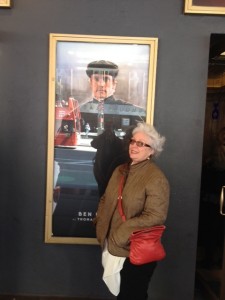Neither Ginny nor I are prone to tout our own abilities, but there are some things we can do, and that’s all there is to it. As it 
 happens, one of them is sitting. Like Will Sonnet, the old TV character played by Walter Brennan put it. “No brag, just fact.” Not that we won’t pee occasionally; not that we’ll always be awake. But park us in a chair, and it’s likely that come hell or high water, we’ll be there long enough to be mistaken for George Segal sculptures. Thus when it was announced last December that Wolf Hall, the two-part adaptation of Hilary Mantel‘s brilliant novels Wolf Hall and Bring Up the Bodies, would be playing on Broadway, we jumped at the chance to see both plays in a single day, which we did last Saturday.
happens, one of them is sitting. Like Will Sonnet, the old TV character played by Walter Brennan put it. “No brag, just fact.” Not that we won’t pee occasionally; not that we’ll always be awake. But park us in a chair, and it’s likely that come hell or high water, we’ll be there long enough to be mistaken for George Segal sculptures. Thus when it was announced last December that Wolf Hall, the two-part adaptation of Hilary Mantel‘s brilliant novels Wolf Hall and Bring Up the Bodies, would be playing on Broadway, we jumped at the chance to see both plays in a single day, which we did last Saturday.
It was a great experience. It was just fun to immerse oneself in theater and historical drama and literature, things we both love. Frankly, we don’t get to it enough. And helping to make it special was that Hilary Mantel herself was at the theater, and I rather fearlessly shook her hand and told her how much I admired her work. I do wish I liked the plays better. I guess they were dramatic enough, but the great pleasure and the great accomplishment of the novels was being inside the head of the main character, Thomas Cromwell, something very difficult to do in a play. As depicted by Mantel, Cromwell was
very intelligent, very shrewd, a great judge of character, a man who had spent his whole life living by his wits, and who was quite good at it. He was also a man of opinion, one who held views about the monarchy and religion and the world generally. We don’t really see much of these attributes in this adaptation. Cromwell is not as complicated: he protects his friends and hurts his  enemies. Way too simplistic, I’m afraid.
enemies. Way too simplistic, I’m afraid.
As it happens, the television adaptation of the novel began on Sunday night, and was pretty much for me everything that the play was not. Cromwell was fleshed out far more fully, and you could see his subtle intelligence at work. Mark Rylance, playing Cromwell, had much more to work with–many more facets of Cromwell’s life was portrayed, and one could see him as father, husband, reformer, and so one. In the best scene in Part One, Cromwell has an audience with the king, Henry VIII, played by Damien Lewis. Cromwell had once been in parliament and was critical of Henry’s war aims in France, and Henry has not forgotten. Henry. a man surrounded by syncophants, is surprised that not only does Cromwell not back down, but he suggests a better way from Henry to get what he wants. There is a moment when a Henry looks at Cromwell with a sidelong glance and a half smile, as though surprised, and even amused, that someone would express to him an original thought. Aha! That’s Wolf Hall in a nutshell–the sublime pleasure in encountering something new and unexpected. I can’t wait for the rest of the series.

